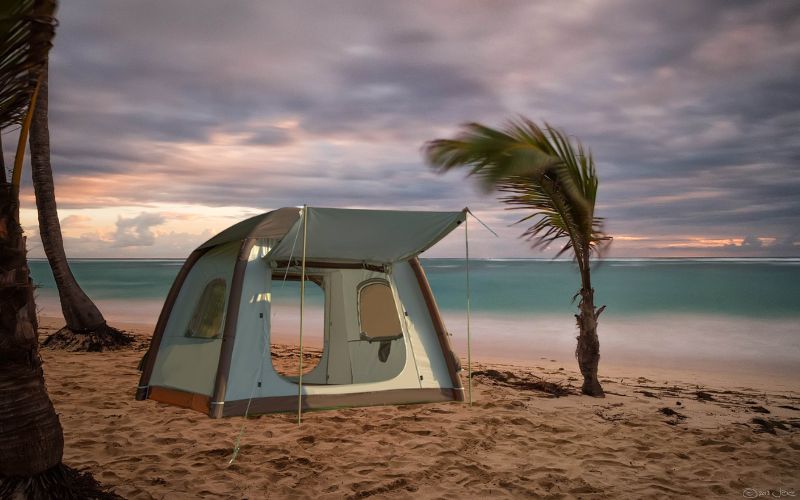Are air tents any good in the wind? To answer this, it’s essential to understand how air tents are designed and how their structure helps withstand windy conditions. Unlike traditional tents that rely on rigid poles, air tents use inflatable beams made from durable materials such as high-density polyethylene or reinforced polyester. These materials are specifically chosen for their strength and flexibility, allowing the beams to bend and absorb wind pressure without breaking.
The inflatable beams are filled with air using a pump, creating a robust and flexible framework that can better handle strong winds. This design reduces the risk of the tent collapsing under wind stress because the air beams can flex and return to shape more effectively than rigid poles. Additionally, air tents are anchored with sturdy guy ropes and pegs, further enhancing their stability in adverse weather.
By using these advanced materials and innovative designs, air tents demonstrate remarkable durability and reliability. So, are air tents any good in the wind? Yes, their unique structure and high-quality materials make them highly effective at withstanding windy conditions, providing a safe and secure shelter for campers.

Are Air Tents Any Good in The Wind? Performance of Air Tents in Windy Conditions
How Air Tents Are Tested for Wind Resistance
Are air tents any good in the wind? Manufacturers rigorously test air tents to ensure their wind resistance. These tests often involve setting up the tents in wind tunnels where they are exposed to controlled wind speeds and directions. The goal is to simulate various windy conditions that campers might encounter. By observing how the inflatable beams and the overall structure respond, manufacturers can identify and improve weak points, ensuring that the tents can withstand strong winds without collapsing.
Real-World Performance: Examples of Air Tents in High Winds
In real-world conditions, air tents have shown impressive resilience against strong winds. For instance, many campers report that air tents, such as those from brands like Vango and Coleman, hold up well during storms, with the inflatable beams bending and flexing without breaking. This flexibility is a significant advantage over traditional pole tents, which are more prone to snapping under wind pressure.
For more options and detailed reviews, check out our homepage featuring the “Top 9 Best Inflatable Tents: Find Your Perfect Shelter.”
Are Air Tents Any Good in The Wind? Advantages of Air Tents in Wind
Flexibility and Resilience of Inflatable Beams Compared to Rigid Poles
Are air tents any good in the wind? Yes, one of their primary advantages is the flexibility and resilience of inflatable beams. Unlike rigid poles, inflatable beams can bend and return to their original shape, absorbing wind pressure more effectively. This design minimizes the risk of structural damage and enhances the tent’s ability to withstand high winds.
Ease of Setup and Stability in Strong Winds
Another significant advantage of air tents is their ease of setup. Inflating the beams is straightforward and can be done quickly with a pump. Once inflated, the beams provide a stable framework that, when anchored with guy ropes and pegs, offers excellent stability even in windy conditions.
Are Air Tents Any Good in The Wind? Tips for Setting Up Air Tents in Windy Conditions
Proper Inflation Techniques and Pressure Settings
To ensure optimal wind resistance, it’s crucial to inflate the air beams to the recommended pressure. Over-inflation or under-inflation can compromise the tent’s stability. Use a pressure gauge to monitor and achieve the correct inflation level.
Securing the Tent with Guy Ropes and Pegs
Properly securing your air tent with strong guy ropes and durable pegs is essential. Ensure that the ropes are taut and the pegs are firmly embedded in the ground. This setup will enhance the tent’s stability and help it withstand strong winds.
Site Selection to Minimize Wind Exposure
Choosing the right site is crucial for reducing wind exposure. Set up your tent in a sheltered area, such as behind natural windbreaks like trees or hills. Avoid open, exposed locations where the wind can hit the tent directly.
Are Air Tents Any Good in The Wind? Comparing Air Tents to Traditional Pole Tents
Wind Resistance: Air Tents vs. Pole Tents
Are air tents any good in the wind? Air tents use inflatable beams instead of rigid poles, allowing them to flex and absorb wind pressure more effectively. This flexibility helps prevent structural damage and reduces the risk of the tent collapsing in high winds. In contrast, traditional pole tents rely on rigid poles that can snap or bend under intense wind pressure, making them more vulnerable to stormy conditions.
Durability and Longevity in Harsh Weather
When considering durability and longevity in harsh weather, air tents often have the advantage. The inflatable beams are made from tough, high-density materials that can withstand repeated flexing without breaking. This makes them more resilient in the face of strong winds, heavy rain, and other harsh weather conditions. Additionally, the overall construction of air tents is designed to be robust, with reinforced seams and durable fabrics that enhance their longevity.
Traditional pole tents, while also made from durable materials, can suffer from pole breakage, especially in high winds. Once a pole snaps, the tent’s stability is compromised, which can lead to further damage and reduced lifespan. Therefore, in terms of both wind resistance and overall durability, air tents often outperform traditional pole tents in challenging weather conditions.
Are Air Tents Any Good in The Wind? Conclusion
In summary, are air tents any good in the wind? Absolutely. Air tents offer superior wind resistance compared to traditional pole tents, thanks to their flexible and resilient inflatable beams. These beams can bend and flex under wind pressure without breaking, providing a stable and secure shelter even in harsh weather conditions. Additionally, the ease of setup and durable construction materials make air tents a convenient and reliable choice for camping vacations.
For those planning their next windy camping trip, considering an air tent can enhance your experience by providing added stability and peace of mind. With their proven performance in real-world conditions and innovative design, air tents are an excellent investment for campers seeking both convenience and durability.
Explore our homepage for detailed reviews and top recommendations on the best inflatable tents to find your perfect shelter.
FAQs: Are Air Tents Any Good in The Wind?
1. How do air tents compare to traditional pole tents in windy conditions? Air tents generally perform better in windy conditions due to their inflatable beams, which are designed to flex and absorb wind pressure without breaking. Traditional pole tents, which use rigid poles, are more susceptible to snapping or bending in strong winds, which can compromise the tent’s stability.
2. What makes air tents durable against strong winds? The durability of air tents in strong winds is attributed to their construction. They are made from high-density, durable materials that can withstand repeated flexing. The inflatable beams distribute wind pressure evenly, reducing the likelihood of damage. Additionally, these tents are typically designed with reinforced seams and strong guy lines that help maintain their structure in adverse conditions.
3. Are there any special setup tips for using air tents in windy weather? Yes, to maximize stability in windy conditions, inflate the beams to the recommended pressure using a pressure gauge. Secure the tent with robust guy ropes and stakes, ensuring they are taut and firmly anchored in the ground. Choosing a sheltered location, such as behind natural windbreaks like trees or hills, can also help minimize wind exposure.
4. Can air tents handle severe weather beyond just wind? Yes, air tents are designed to handle a range of severe weather conditions, including heavy rain and storms. Their durable fabrics and well-engineered construction help keep the interior dry and secure. Properly set up and maintained, air tents can provide reliable shelter in various challenging environments.
